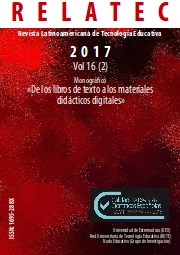Analysis of Spanish commercial digital educational platforms for Primary Education
DOI:
https://doi.org/10.17398/1695-288X.16.2.49Keywords:
Materiales educativos digitales, Tecnología Educativa, Plataformas Digitales, Educación Primaria, Digital Educational Materials, Educational Technology, Digital Platforms, Primary EducationAbstract
As a consequence of the technological advance and the massive arrival of ICT in the classroom, today we are experiencing a process of transition in schools that affects the teaching media and materials used in the teaching and learning processes. The pedagogical use in classrooms of digital content or online teaching materials is already a tangible reality that evidences a process of gradual change from traditional textbooks to new digital resources for learning. This article analyzes the pedagogical, socio-communicational and technological characteristics of a sample of commercial platforms of digital educational contents currently existing in Spain destined for Primary Education and in two autonomous communities: Galicia and Valencia. The results presented are part of the research project «The school of digital society: Analysis and proposals for the production and use of educational digital content» (EDU2015-64593-R) carried out by several competitive research groups of various universities, coordinated by the 'Laboratory of Research and New Technologies' (EDULLAB) of the University of La Laguna. To this end, an ad hoc instrument was developed and validated and administered to 13 commercial platforms. The results suggest that there is a wide range of online offer of teaching materials with a variety of formats, although the study has found that most reproduce the format of the traditional book, enriched with online resources..
Downloads
References
Cid Fernández, XM y Rodríguez Rodríguez, X. (2012) (coords.). A Fenda Dixital: as TIC, entre a escola e a comunidade. Santiago de Compostela: Nova Escola Galega
Collado, C. C., Fernández, J. M., y Cantos, J. L. M. (2011). La brecha digital de género en España y Europa: medición con indicadores compuestos/The Digital Divide from a Gender Perspective in Spain and Europe: Measuring with Composite Indicators. Reis, 127-140.
Fundación Telefónica (2016). La Sociedad de la Información en España 2015. Madrid/Barcelona: Fundación Telefónica/Editorial Ariel.
Martínez Bonafé, J. y Rodríguez Rodríguez, J. (2010). El currículum y el libro de texto. Una dialéctica siempre abierta. En J. Gimeno Sacristán (Comp.), Saberes e incertidumbres sobre el currículum, (pp. 246-268). Madrid: Morata.
Mur Sangrá, L. (2016). La nueva brecha digital. El futuro de las nuevas tecnologías en Primaria desde la formación del Profesorado. Revista Electrónica Interuniversitaria de Formación del Profesorado, 19(2), 301-313.
Neto, E. S. (2009). La sociedad de la información en Brasil y España : estudio comparado basado en
programas de inclusión digital. Madrid: Universidad Carlos III
Pinto Arboleda, M. C. (2012). La construcción de la referencia en torno al concepto de brecha digital en España. Madrid: Universidad Complutense. Tesis doctoral
Rodríguez Miranda, F. de. P. (2009). Los coordinadores y coordinadoras de Centros TIC: su importancia como asesores internos para la calidad y el desarrollo del currículo en la Educación Primaria de Andalucía. Huelva: Universidad de Huelva
Rodríguez-Regueira, N. y Rodríguez-Rodríguez, J. (2015). The digital textbook. A look at the current state of the art. En J. Rodríguez Rodríguez, J., E. Bruillard y M. Horsley, Digital Textbooks, What´s NEW?. (pp. 17-121). Santiago de Compostela: USC/IARTEM,
Rodríguez Rodríguez, J., Bruillard, E. y Horsley, M. (2015) Digital Textbooks, What´s NEW?. Santiago de Compostela: USC/IARTEM
Santiago Segura, M.J. (2015). La segunda brecha digital como un problema de desigualdad de género: un estudio de su evolución. Granada: Universidad de Granada
Pérez Tornero, J. M., y Pi, M. (2013). La integración de las TIC y los libros digitales en la educación: actitudes y valoraciones del profesorado en España. Barcelona: Planeta. Recuperado a partir de http://www.aulaplaneta.com/descargas/aulaPlaneta_Dossier-estudio-TIC.pdf
UNESCO (2003). Cumbre mundial sobre la sociedad de la información. (Ginebra 2003 – Túnez 2005). Declaración de Principios. Construir la sociedad de la información: un desafío mundial para el nuevo milenio. Ginebra: UNESCO.
UNESCO (2005). Hacia las sociedades del conocimiento. Informe Mundial de la Educación. Paris: UNESCO
Xunta de Galicia (2017). Datos e cifras do ensino non universitario. Santiago de Compostela: Xunta de Galicia/Consellería de Cultura, Educación e Ordenación Universitaria. Recuperado de http://www.edu.xunta.gal/portal/sites/web/files/datos_e_cifras_do_ensino_non_universitario_1718.pdf
Downloads
Published
Issue
Section
License
Authors who publish in this journal accept the following conditions:
1. The Author retains copyright in the article. Upon acceptance of the article, the author shall grant to the Publisher the right of first publication of the article. with the dcoument registered with the Creative Commons Attribution-NonCommercial-NoDerivative 4.0 International (CC BY-NC-ND) license, which allows to third parties to use what is published whenever they mention the authorship of the work and the first publication in this journal.
2. Authors can make other independent and additional contractual agreements for the non-exclusive distribution of the article published in this journal (eg, include it in an institutional repository or publish it in a book) provided they clearly indicate that the work was published for the first time in this journal.
3. Authors are allowed and recommended to publish their work on the Internet (for example on institutional or personal pages) before and during the review and publication process, as it can lead to productive exchanges and a greater and faster diffusion of published work (see The Effect of Open Access).









